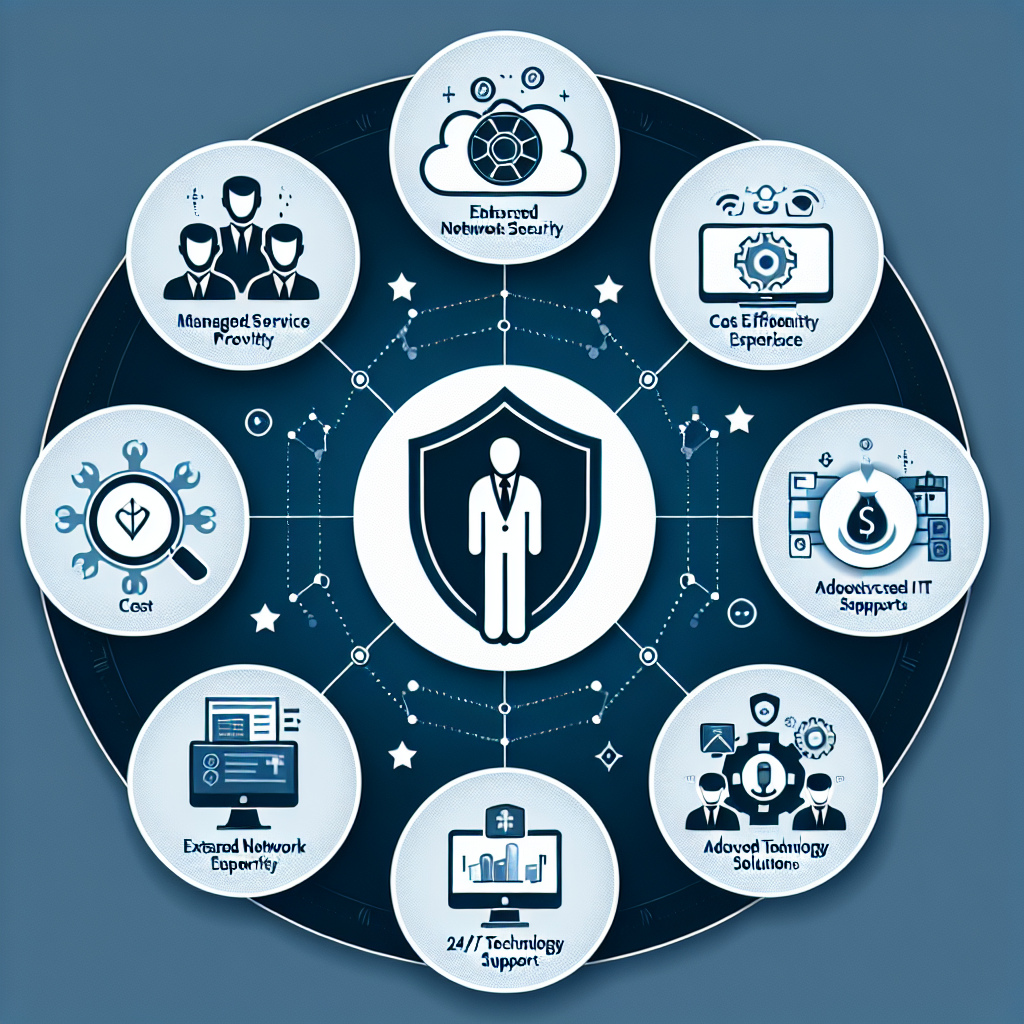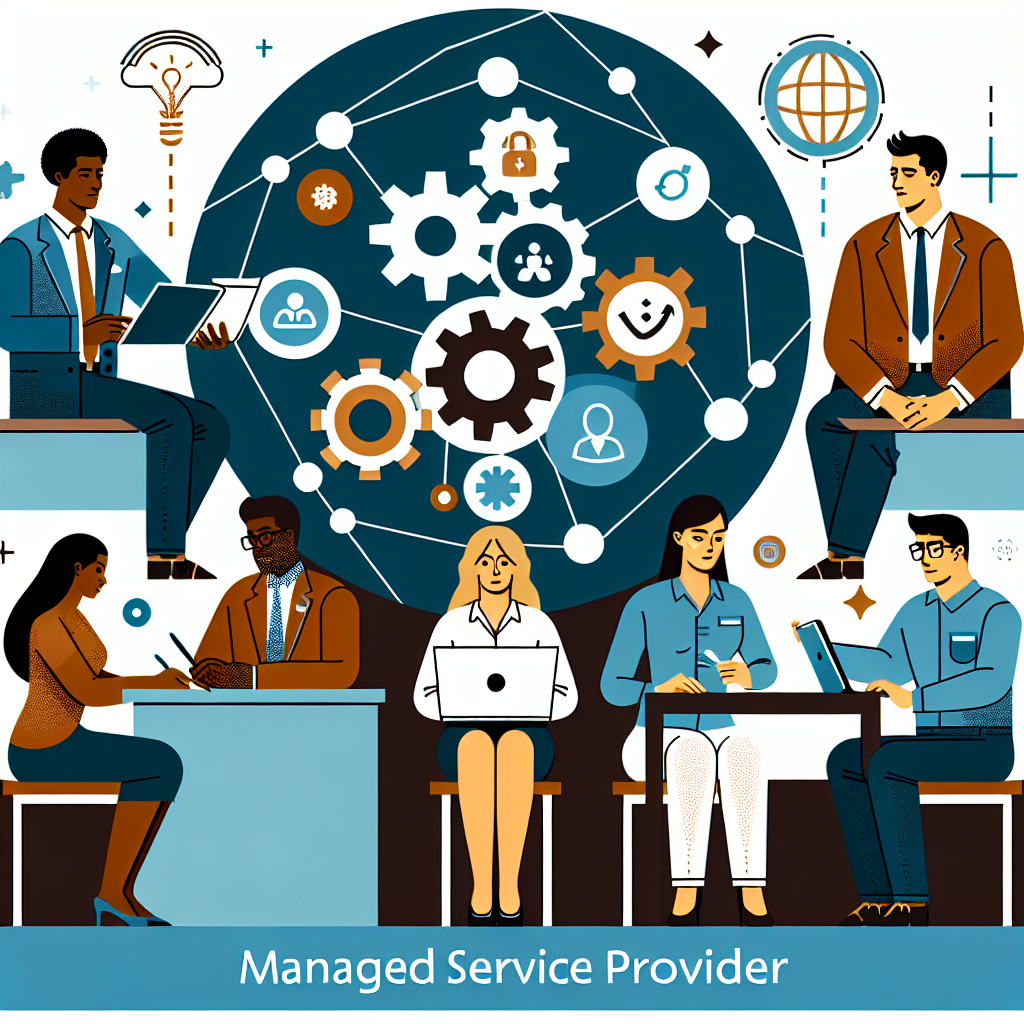Your cart is currently empty!
Tag: Managed Service Provider

Managed Service Providers: A Cost-Effective Solution for IT Management
Managed Service Providers (MSPs) are becoming an increasingly popular choice for businesses looking to outsource their IT management. With the rapid advancement of technology and the increasing complexity of IT systems, many companies are finding it challenging to keep up with the demands of managing their own IT infrastructure. This is where MSPs come in, offering a cost-effective solution for IT management that can help businesses stay ahead of the curve.One of the key benefits of working with an MSP is the cost savings that can be achieved. Instead of hiring a full-time IT staff, businesses can simply pay a monthly fee to an MSP for all of their IT needs. This can result in significant cost savings, as businesses no longer have to worry about the overhead costs associated with hiring and training IT staff. Additionally, MSPs often have access to the latest technology and tools, which can help businesses save money on hardware and software expenses.
Another benefit of working with an MSP is the expertise and experience that they bring to the table. MSPs are typically staffed with highly skilled IT professionals who have a wealth of knowledge and experience in managing IT systems. This expertise can be invaluable for businesses looking to improve their IT infrastructure and stay ahead of the competition. MSPs can also provide proactive monitoring and maintenance services, helping businesses to prevent IT issues before they become major problems.
In addition to cost savings and expertise, working with an MSP can also help businesses improve their overall efficiency and productivity. By outsourcing IT management to a third-party provider, businesses can focus on their core operations and leave the IT management to the experts. This can result in increased efficiency, as businesses no longer have to worry about IT issues interfering with their day-to-day operations. MSPs can also provide 24/7 support, ensuring that businesses have access to IT assistance whenever they need it.
Overall, Managed Service Providers offer a cost-effective solution for businesses looking to outsource their IT management. With the expertise, experience, and efficiency that MSPs bring to the table, businesses can improve their IT infrastructure and stay ahead of the competition. If you are looking to streamline your IT management and save money in the process, consider working with an MSP today.

Tips for Evaluating and Selecting the Best Managed Service Provider for Your Needs
In today’s fast-paced business world, many companies are turning to managed service providers (MSPs) to help manage their IT infrastructure and support their technology needs. With so many MSPs to choose from, it can be overwhelming to know which one is the best fit for your organization. Here are some tips for evaluating and selecting the best MSP for your needs.1. Define your needs: Before you start looking for an MSP, it’s important to clearly define your organization’s IT needs and goals. Consider what services you need, such as cloud hosting, cybersecurity, helpdesk support, or network monitoring. Understanding your needs will help you narrow down your options and find an MSP that can meet your specific requirements.
2. Look for experience and expertise: When evaluating MSPs, be sure to consider their experience and expertise in managing IT infrastructure. Look for providers with a proven track record of success and a team of certified professionals who are knowledgeable in the latest technologies and best practices.
3. Consider scalability: As your business grows, your IT needs will evolve. When selecting an MSP, it’s important to choose a provider that can scale with your business. Look for an MSP that offers flexible solutions and can easily adapt to your changing requirements.
4. Evaluate security measures: Cybersecurity is a top priority for businesses of all sizes. When selecting an MSP, be sure to inquire about their security measures and protocols. Look for providers that have robust security practices in place to protect your data and systems from cyber threats.
5. Check for compliance certifications: Depending on your industry, you may be required to comply with specific regulations and standards, such as HIPAA or GDPR. When selecting an MSP, be sure to check for compliance certifications that demonstrate their commitment to data security and privacy.
6. Review service level agreements (SLAs): SLAs outline the level of service that an MSP will provide and the metrics by which their performance will be measured. Be sure to review the SLAs of potential MSPs to ensure they align with your expectations and requirements.
7. Seek references and reviews: Before making a decision, be sure to seek references and reviews from current or past clients of the MSP. This will give you valuable insight into the provider’s reputation, customer service, and overall performance.
8. Consider cost and value: While cost is an important factor to consider, it’s also important to evaluate the value that an MSP can provide to your organization. Look for providers that offer competitive pricing and a range of services that align with your needs and budget.
In conclusion, selecting the best managed service provider for your organization requires careful evaluation and consideration of your specific needs, goals, and requirements. By following these tips, you can find an MSP that can support your IT infrastructure and help your business thrive in today’s digital landscape.

How Managed Service Providers Can Help Your Business Scale
Managed service providers (MSPs) are becoming increasingly popular among businesses of all sizes as they offer a wide range of benefits that can help organizations scale and grow. In a fast-paced and competitive business environment, having the right technology infrastructure and support is essential for success. MSPs can provide the expertise and resources necessary to ensure that your business remains agile, efficient, and secure.One of the key ways that MSPs can help your business scale is by providing proactive IT management and support. Instead of waiting for problems to arise and then trying to fix them, MSPs monitor your systems and networks 24/7 to identify and address issues before they become major problems. This proactive approach helps to minimize downtime and ensure that your business operations run smoothly.
MSPs also offer a wide range of services and solutions that can help your business adapt and grow in a rapidly changing business environment. From cloud computing and data storage to cybersecurity and disaster recovery, MSPs have the expertise and resources to help you leverage the latest technologies and best practices to drive innovation and growth.
Another way that MSPs can help your business scale is by providing cost-effective solutions that can help you reduce IT expenses and improve your bottom line. By outsourcing your IT management and support to an MSP, you can avoid the high costs associated with hiring and training in-house IT staff, as well as the costs of purchasing and maintaining hardware and software. This can free up valuable resources that can be reinvested in other areas of your business to support growth and expansion.
In addition, MSPs can help your business scale by providing access to a team of highly skilled and experienced IT professionals who can help you navigate complex IT challenges and make strategic decisions that will support your business goals. With their expertise and support, you can focus on running and growing your business, knowing that your IT infrastructure is in good hands.
Overall, managed service providers can play a crucial role in helping your business scale and grow by providing proactive IT management and support, cost-effective solutions, access to the latest technologies, and a team of skilled professionals to support your business needs. By partnering with an MSP, you can gain a competitive edge in today’s business environment and position your business for long-term success and growth.

Choosing the Right Managed Service Provider for Your Company: A Guide
In today’s fast-paced business environment, companies are increasingly turning to Managed Service Providers (MSPs) to handle their IT needs. MSPs offer a wide range of services, from network monitoring and security to data backup and disaster recovery. Choosing the right MSP for your company is crucial, as they will play a key role in ensuring the smooth operation of your business.Here are some key factors to consider when selecting an MSP for your company:
1. Experience and Expertise: Look for an MSP that has a proven track record in providing IT services to companies in your industry. They should have a team of experienced professionals who are experts in their field and are up-to-date on the latest technologies and trends. Check their references and ask for case studies to see how they have helped other businesses.
2. Services Offered: Consider what services your company needs and make sure the MSP offers them. Some common services provided by MSPs include network monitoring, security, data backup, and cloud services. Make sure the MSP can tailor their services to meet your specific needs and can scale as your business grows.
3. Security and Compliance: Data security is a top priority for businesses, especially in industries that handle sensitive information. Ensure the MSP has robust security measures in place to protect your data from cyber threats. They should also be compliant with industry regulations and standards, such as HIPAA for healthcare or GDPR for data protection.
4. Support and Response Times: It’s important to choose an MSP that offers 24/7 support and has a fast response time to address any IT issues that may arise. Make sure they have a dedicated support team that can quickly resolve problems and minimize downtime for your business.
5. Pricing and Contracts: Consider the cost of the MSP’s services and compare them with other providers in the market. Look for a provider that offers flexible pricing options and transparent contracts with no hidden fees. Make sure you understand what is included in the service agreement and what additional costs may apply.
6. Communication and Relationship: A successful partnership with an MSP is built on good communication and a strong relationship. Choose a provider that is responsive to your needs and keeps you informed about the status of your IT systems. They should act as a trusted advisor, offering recommendations for improving your IT infrastructure and helping you achieve your business goals.
In conclusion, choosing the right Managed Service Provider for your company is a critical decision that can have a significant impact on your business operations. By considering factors such as experience, services offered, security, support, pricing, and communication, you can find an MSP that meets your needs and helps your company thrive in today’s competitive business landscape.

The Top 5 Benefits of Using a Managed Service Provider for Your Business
In today’s fast-paced business environment, it is more important than ever for companies to stay ahead of the competition and maximize their efficiency. One way to achieve this is by utilizing the services of a managed service provider (MSP). An MSP is a third-party company that manages the IT infrastructure and services of a business, allowing the company to focus on its core operations.Here are the top 5 benefits of using a managed service provider for your business:
1. Cost savings: One of the biggest advantages of using an MSP is the potential for cost savings. By outsourcing IT services to a managed service provider, companies can eliminate the need to hire and train in-house IT staff, saving on payroll and benefits costs. Additionally, MSPs typically offer fixed monthly pricing plans, allowing businesses to budget their IT expenses more effectively.
2. Increased efficiency: Managed service providers are experts in managing IT infrastructure and services, which means they can quickly resolve any issues that arise and keep systems running smoothly. This can help minimize downtime and ensure that employees can focus on their work without being interrupted by technical problems.
3. Access to the latest technology: Keeping up with the latest technology can be a challenge for businesses, especially smaller companies with limited resources. Managed service providers have access to the latest tools and technologies, allowing them to provide cutting-edge solutions to their clients. This can help businesses stay competitive and adapt to changing market conditions.
4. Enhanced security: Cybersecurity is a major concern for businesses of all sizes, as data breaches can have devastating consequences. Managed service providers have the expertise and resources to implement robust security measures and protect sensitive company data from cyber threats. This can give businesses peace of mind knowing that their IT systems are secure and protected.
5. Scalability: As businesses grow and evolve, their IT needs may change. Managed service providers offer scalable solutions that can easily adapt to the changing needs of a business. Whether a company needs to add new users, upgrade software, or expand its infrastructure, an MSP can provide the necessary support and resources to accommodate these changes.
In conclusion, utilizing a managed service provider can offer numerous benefits for businesses, including cost savings, increased efficiency, access to the latest technology, enhanced security, and scalability. By outsourcing IT services to an MSP, companies can focus on their core operations and drive growth and success in today’s competitive business landscape.

Case Studies: How Companies Have Thrived with the Help of Managed Service Providers
In today’s fast-paced and ever-changing business environment, companies are constantly looking for ways to stay ahead of the competition and maximize efficiency. One way that many companies have found success is by enlisting the help of managed service providers (MSPs) to handle their IT needs.MSPs are companies that specialize in managing and maintaining a company’s IT infrastructure, from network security to data backup and recovery. By outsourcing these tasks to a third-party provider, companies can focus on their core business functions and leave the technical details to the experts.
One industry that has seen great success with the help of MSPs is the healthcare sector. With the increasing digitization of patient records and the need for secure and reliable IT systems, healthcare providers are turning to MSPs to ensure that their systems are up and running 24/7. By partnering with an MSP, healthcare companies can ensure that their patients’ data is safe and secure, while also meeting regulatory compliance requirements.
Another industry that has thrived with the help of MSPs is the financial services sector. With the rise of online banking and mobile payment systems, financial institutions are under constant pressure to ensure that their systems are secure and reliable. By partnering with an MSP, banks and financial companies can ensure that their systems are protected from cyber threats and downtime, allowing them to focus on providing top-notch service to their customers.
One company that has seen great success with the help of an MSP is a global e-commerce retailer. With millions of customers around the world and a complex IT infrastructure to manage, the company turned to an MSP to handle their IT needs. By partnering with an MSP, the company was able to streamline their operations, improve their security posture, and reduce downtime, leading to increased customer satisfaction and profitability.
Overall, the use of managed service providers has proven to be a game-changer for many companies looking to stay ahead in today’s competitive business landscape. By outsourcing their IT needs to a trusted third-party provider, companies can focus on what they do best while leaving the technical details to the experts. Whether it’s ensuring the security of patient data in healthcare or protecting financial transactions in the banking sector, MSPs have proven to be invaluable partners in helping companies thrive in today’s digital age.

The Future of Managed Service Providers: Trends and Technologies to Watch
Managed service providers (MSPs) play a crucial role in helping businesses navigate the ever-evolving landscape of technology. As technology continues to advance at a rapid pace, MSPs are tasked with staying ahead of the curve and providing cutting-edge solutions to their clients. In this article, we will explore the trends and technologies that are shaping the future of MSPs.One of the key trends that MSPs are currently facing is the shift towards cloud-based services. With more and more businesses moving their operations to the cloud, MSPs are being called upon to provide expertise in managing and securing cloud environments. This includes helping clients migrate their data and applications to the cloud, as well as implementing robust security measures to protect sensitive information.
Another trend that is shaping the future of MSPs is the increasing demand for managed cybersecurity services. With cyber threats becoming more sophisticated and prevalent, businesses are looking to MSPs to provide comprehensive security solutions to protect their networks and data. MSPs are now offering services such as threat detection and response, vulnerability assessments, and security awareness training to help clients defend against cyber attacks.
In addition to cloud and cybersecurity services, MSPs are also embracing technologies such as artificial intelligence (AI) and machine learning to enhance their offerings. AI-powered tools can help MSPs automate routine tasks, improve efficiency, and provide predictive analytics to anticipate and prevent potential issues before they arise. By leveraging these technologies, MSPs can deliver more proactive and personalized services to their clients.
As the role of MSPs continues to evolve, it is essential for them to stay abreast of the latest trends and technologies in the industry. By investing in training and development, staying informed about emerging technologies, and adapting their services to meet the changing needs of their clients, MSPs can position themselves as trusted advisors in a rapidly changing technological landscape.
In conclusion, the future of managed service providers is bright, with opportunities for growth and innovation abound. By embracing cloud services, cybersecurity solutions, and emerging technologies such as AI, MSPs can continue to provide valuable services to their clients and remain at the forefront of the industry. As businesses continue to rely on technology to drive their operations, MSPs will play a crucial role in helping them succeed in the digital age.

Managed Service Providers: A Key Player in Business Continuity and Disaster Recovery
In today’s digital age, businesses are more reliant on technology than ever before. From storing important data to communicating with customers, technology plays a crucial role in the day-to-day operations of companies large and small. However, with this increased reliance on technology comes the potential for unexpected disasters that can disrupt business operations and put sensitive data at risk.This is where Managed Service Providers (MSPs) come in. MSPs are companies that provide IT services and support to businesses on an ongoing basis. They help companies manage their technology infrastructure, monitor for potential issues, and provide support when problems arise. One of the key services that MSPs offer is business continuity and disaster recovery planning.
Business continuity and disaster recovery planning is essential for businesses to ensure that they can continue to operate in the event of a disaster, such as a cyber attack, natural disaster, or hardware failure. MSPs play a crucial role in helping businesses develop and implement a comprehensive plan to minimize downtime and data loss in the event of a disaster.
MSPs work with businesses to assess their current IT infrastructure and identify potential risks and vulnerabilities. They help businesses develop a plan that outlines how data will be backed up, how systems will be restored, and how operations will be maintained in the event of a disaster. MSPs also provide ongoing monitoring and support to ensure that the plan remains up-to-date and effective.
In addition to helping businesses develop a disaster recovery plan, MSPs also provide the technology and resources needed to implement the plan. This includes technologies such as cloud backup and recovery solutions, virtualization, and secure data storage. MSPs also provide 24/7 support to quickly address any issues that arise during a disaster.
By working with an MSP to develop a business continuity and disaster recovery plan, businesses can ensure that they are prepared for any unexpected event that could disrupt their operations. MSPs help businesses mitigate risks, minimize downtime, and protect sensitive data, ultimately helping them maintain business continuity and recover quickly from a disaster.
In conclusion, Managed Service Providers are a key player in business continuity and disaster recovery. By partnering with an MSP, businesses can have peace of mind knowing that they have a comprehensive plan in place to protect their data and ensure that they can continue to operate in the face of any disaster. With their expertise and support, MSPs help businesses navigate the complexities of IT disaster recovery and ensure that they are prepared for any unexpected event.

Why Small Businesses Should Consider Partnering with a Managed Service Provider
Small businesses often face numerous challenges when it comes to managing their IT infrastructure. Limited resources, lack of expertise, and the need to focus on core business activities can make it difficult for small businesses to effectively manage their technology needs. This is where partnering with a managed service provider (MSP) can be extremely beneficial.An MSP is a third-party company that manages a business’s IT infrastructure and services on a proactive basis, rather than waiting for something to break. By partnering with an MSP, small businesses can access a wide range of IT services and expertise without the need to hire and train in-house IT staff.
One of the key reasons why small businesses should consider partnering with an MSP is cost savings. By outsourcing their IT needs to an MSP, small businesses can reduce costs associated with hiring and training IT staff, purchasing and maintaining hardware and software, and dealing with unexpected IT issues. MSPs typically offer a range of pricing options, including flat-rate monthly fees, which can help small businesses better budget for their IT expenses.
Additionally, partnering with an MSP can help small businesses improve their overall IT security. MSPs have the expertise and resources to implement and maintain robust security measures, such as firewalls, antivirus software, and data encryption, to protect a business’s sensitive information from cyber threats. This is especially important for small businesses, as they are often targeted by cybercriminals due to their perceived lack of security measures.
Another reason why small businesses should consider partnering with an MSP is the ability to access the latest technology and IT solutions. MSPs are constantly updating their skills and knowledge to stay ahead of the curve when it comes to new technologies and trends. By partnering with an MSP, small businesses can benefit from access to cutting-edge IT solutions that can help them improve productivity, efficiency, and competitiveness.
Furthermore, partnering with an MSP can help small businesses improve their overall IT performance and reliability. MSPs proactively monitor and maintain a business’s IT infrastructure to prevent issues before they occur, minimizing downtime and disruptions to business operations. This can help small businesses maintain a high level of productivity and customer satisfaction.
In conclusion, partnering with a managed service provider can offer numerous benefits for small businesses, including cost savings, improved security, access to the latest technology, and enhanced IT performance and reliability. By outsourcing their IT needs to an MSP, small businesses can focus on what they do best – running and growing their business – while leaving their IT needs in the hands of experts.

Understanding the Value of Managed Service Providers in Today’s Digital Landscape
In today’s fast-paced digital landscape, businesses are constantly looking for ways to stay competitive and efficient. One of the key components to achieving this is through the use of managed service providers (MSPs). Managed service providers are third-party companies that manage and support the IT infrastructure of businesses, allowing them to focus on their core functions and objectives.One of the key benefits of working with an MSP is cost-effectiveness. By outsourcing IT management to a third-party provider, businesses can reduce their overall IT expenses significantly. MSPs typically offer services on a subscription basis, which means businesses only pay for the services they need, when they need them. This can result in significant cost savings compared to hiring in-house IT staff or dealing with the costs of downtime due to IT issues.
Another key advantage of working with an MSP is access to specialized expertise. MSPs typically have a team of highly skilled and certified IT professionals who are experts in a wide range of technologies and systems. This means that businesses can benefit from the latest technologies and best practices without having to invest in training or hiring new staff.
MSPs also provide businesses with greater flexibility and scalability. As businesses grow and evolve, their IT needs may change. MSPs can easily scale their services up or down to meet the changing needs of their clients, providing businesses with the flexibility they need to adapt to market conditions and growth.
Security is another critical aspect of managed services. With the increasing number of cyber threats and data breaches, businesses need to ensure that their IT infrastructure is secure and protected. MSPs have the expertise and resources to implement robust security measures and protocols to safeguard businesses from potential threats.
Overall, working with a managed service provider can provide businesses with a range of benefits, including cost savings, access to specialized expertise, flexibility, scalability, and enhanced security. In today’s digital landscape, where technology plays a crucial role in business operations, partnering with an MSP can help businesses stay competitive, efficient, and secure.
